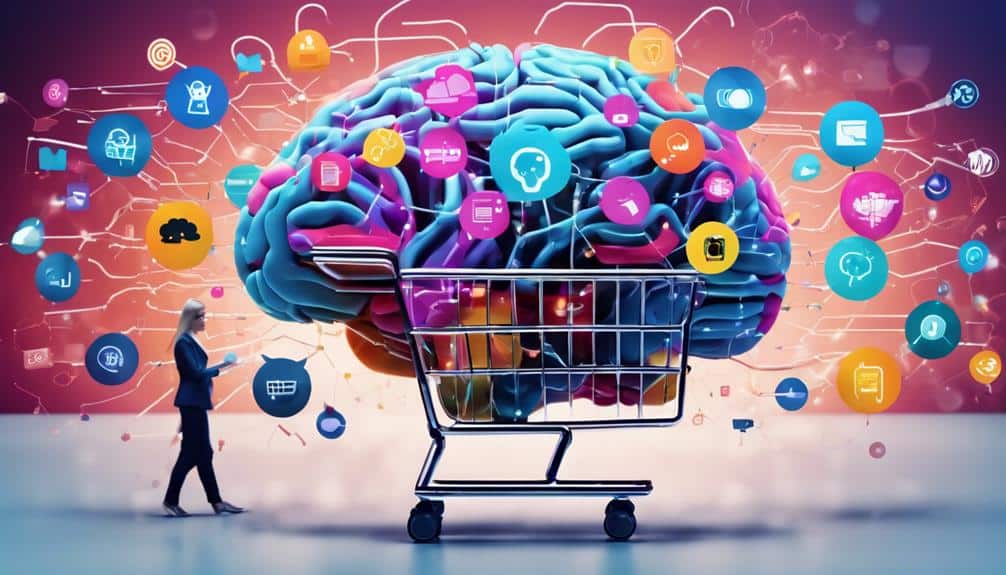AI-powered marketing campaigns represent a pivotal shift in customer engagement strategies underpinned by data analytics and machine learning. These campaigns analyze extensive customer data to deliver highly customized content, significantly enhancing customer experience and interaction. Evidence shows that adoptingAI in marketing strategies correlates with a 19% average increase in sales, a 20% rise in customer satisfaction, and up to a 30% boost in conversion rates. Additionally, custom email campaigns have showcased a sixfold increase in transaction rates. By leveraging AI-driven insights, brands achieve a more profound, data-driven connection with their audience, optimizing marketing investments for superior outcomes. Exploring the full potential of these technologies reveals further opportunities for refinement and growth in personalized marketing efforts.
Revolutionize Marketing With Launched's AI-Powered StrategiesKey Takeaways
- AI marketing campaigns tailor content using customer data analysis for enhanced engagement.
- Machine learning algorithms predict consumer behaviors, optimizing personalized experiences.
- Real-time optimization of strategies increases conversion rates by up to 56%.
- AI-driven personalization reduces marketing costs by 30%, improving ROI.
- Chatbots and dynamic email content offer 24/7 engagement, boosting interaction rates.
The AI-Powered Marketing Revolution
Embracing the AI Tailoring Revolution, businesses are witnessing a transformative leap in marketing effectiveness, underscored by up to a 74% increase in customer engagement. This paradigm shift is primarily fueled by the strategic deployment of AI-powered tailored marketing campaigns, which leverage customer data to deliver highly tailored experiences. By harnessing AI tools, companies can analyze vast datasets more efficiently, uncovering insights that drive creating more relevant and engaging content.
The impact of AI-driven tailoring is both profound and far-reaching. Tailored emails, crafted with AI technology, have been shown to drive a 6x higher transaction rate, highlighting the potent efficacy of tailored messaging. Additionally, adopting AI for tailoring purposes correlates with an average sales increase of 19%, demonstrating the technology’s ability to enhance the bottom line. Additionally, businesses that integrate AI-based tailoring strategies report a 20% rise in customer satisfaction and as much as a 30% boost in conversion rates. These metrics underscore the transformative potential of AI in crafting tailored experiences that captivate and convert, offering a new frontier of freedom in marketing strategy optimization.
Understanding AI in Marketing
As we evolve in comprehending AI in marketing, it is vital to acknowledge the groundwork it lays for revolutionizing tailored campaigns. The integration of AI streamlines the processing of extensive behavioral datasets, enabling precise and instant targeting that greatly enhances engagement strategies. By concentrating on AI marketing fundamentals, businesses can leverage the power to improve engagement, achieve higher conversion rates, and optimize marketing effectiveness.
AI Marketing Fundamentals
To grasp the transformative impact of AI in marketing, one must understand how algorithms analyze vast datasets to craft tailored customer experiences with remarkable precision. AI in marketing harnesses these algorithms to sift through and interpret massive amounts of data, enabling the delivery of highly personalized campaigns that resonate uniquely. This capability enhances user engagement and dramatically improves the potential for conversions. Moreover, AI facilitates real-time optimization of marketing strategies, ensuring that businesses can swiftly adapt to changing consumer preferences and behaviors. Automating personalized content delivery is a cornerstone of AI-driven marketing, a crucial tool for companies aiming to secure a competitive edge. Through these mechanisms, AI in marketing fosters a landscape where personalized customer experiences are not just a goal but a standard.
Enhancing Engagement Strategies
Utilizing AI in marketing to enhance engagement strategies allows for meticulous customer data analysis, essential in delivering highly tailored content that significantly boosts customer interaction. Tailored marketing, empowered by AI-powered tools, has notably increased customer engagement by 74% on average. By understanding and integrating AI in marketing efforts, companies can customize messages to meet individual preferences, enhancing engagement rates. Additionally, AI-driven personalized campaigns have demonstrated a remarkable 56% increase in conversion rates, highlighting the effectiveness of optimized engagement strategies. AI’s capability to generate dynamic and customized content resonates deeply with customers, leading to elevated levels of engagement. This analytical marketing approach, focusing on customer data and tailored marketing through AI-powered tools, aligns with the desire for individual preferences, underscoring the transformative impact of AI on customer engagement strategies.
Benefits of AI-Driven Campaigns

AI-driven marketing campaigns significantly shift how businesses approach customer engagement, showcasing quantifiable benefits across various metrics. By leveraging advanced algorithms, these campaigns achieve a remarkable level of tailoring, leading to a notable increase in engagement rates and conversion efficiency. Moreover, the strategic allocation of marketing budgets powered by AI analytics guarantees an optimized return on investment, reinforcing the value of tailored marketing strategies in today’s digital landscape.
Enhanced Personalization Techniques
Harnessing the power of artificial intelligence, tailored marketing campaigns have demonstrated a remarkable ability to increase customer engagement by as much as 74% by delivering content adapted to specific preferences. This surge in engagement, directly attributable to AI-driven personalization, is not merely about creating a buzz; it translates into tangible benefits. On average, tailored campaigns result in a 10% increase conversion rates, signifying a direct correlation between personalized experiences and consumer action. Additionally, by leveraging AI to dissect and utilize consumer data, businesses can craft campaigns that resonate individually, boosting customer loyalty and driving a 20% uptick in sales revenue. Equally important, the efficiency fostered by AI personalization reduces marketing expenditures by 30%, underscoring the dual advantage of cost savings and enhanced campaign efficacy.
Improved Engagement Rates
Implementing artificial intelligence in marketing strategies has markedly enhanced engagement rates, with campaigns experiencing up to a 29% increase in open rates and a 45% surge in click-through rates. This significant uplift demonstrates the power of AI in engaging audiences more effectively than traditional methods.
- Tailoring Subject Lines: AI-generated personalized subject lines have led to a 26% higher distinct open rate, underlining the importance of customization in capturing consumer attention.
- Tailored Content: AI’s ability to deliver content that resonates with specific preferences has seen a 20% increase in sales conversion rates, showcasing the effectiveness of personalized marketing communications.
- Dynamic Content Variations: Using AI to create dynamic content variations has boosted engagement rates by 33%, emphasizing the role of AI in fostering customer engagement and loyalty through varied and relevant content experiences.
Efficient Budget Allocation
Budget allocation optimization, a cornerstone of successful marketing campaigns, is greatly enhanced through the analytical prowess of artificial intelligence, enabling businesses to achieve superior returns on investment. AI-driven marketing harnesses customer data and data-driven insights to tailor tailored campaigns, ensuring efficient budget allocation. This strategic approach elevates the effectiveness of marketing efforts and maximizes cost-efficiency by reallocating resources to high-impact campaigns.
| Benefit | Impact |
|---|---|
| Targeted Spending | Maximizes ROI by focusing on profitable segments |
| Reallocation of Resources | Enhances cost-effectiveness with higher conversion rates |
| Prevention of Wastage | Focuses spending on high-impact campaigns |
Through these mechanisms, AI-driven strategies empower businesses with the freedom to optimize their marketing investments for the best possible outcomes.
Critical Components of AI Personalization

Several vital components underpin the effectiveness of AI tailoring in marketing, including analyzing extensive customer data and applying machine learning algorithms to forecast consumer behaviors and preferences. This technological approach not only refines the marketing strategies but also dramatically enhances the intimate connection between brands and consumers. By leveraging these components, businesses can craft tailored marketing messages that resonate deeply with unique customer profiles, driving engagement and loyalty.
Critical components of AI tailoring include:
- Customer Data Analysis: At the heart of AI tailoring lies the extensive collection and analysis of customer data. This includes browsing history, purchase records, and social media interactions, which provide a detailed overview of customer preferences and behaviors.
- Machine Learning algorithms analyze vast datasets to identify patterns and predict future customer behavior. This predictive capability allows for creating more effective and targeted marketing strategies.
- Creation of Detailed Customer Profiles: AI uses the analyzed data to construct detailed customer profiles. These profiles enable marketers to understand their audience granularly and tailor personalized marketing messages to each customer’s preferences and needs.
Strategies for Content Tailoring
Effectively tailoring content in AI-powered marketing campaigns necessitates a deep, data-driven understanding of tailored customer preferences and behaviors. By leveraging sophisticated AI algorithms, marketers can sift through vast quantities of customer data to craft tailored messages that resonate on a personalized level. This precision enhances the relevance of marketing communications and dramatically boosts engagement and conversion rates, underlining the pivotal role of dynamic content generation in fostering customer satisfaction and loyalty.
| Strategy | Impact |
|---|---|
| Analyzing Customer Data | Pinpoints specific preferences for highly targeted content |
| Tailored Message Creation | Enhances relevance, driving engagement and conversions |
| Dynamic Content Generation | Adapts in real-time to feedback for optimal relevance |
| Monitoring Customer Satisfaction | Assesses the effectiveness of tailored content strategies |
This analytical, data-driven approach guarantees that content aligns with specific preferences and evolves based on real-time interactions and feedback, maximizing customer satisfaction. Consequently, AI-powered content tailoring strategies are essential for marketers seeking to establish enduring brand relationships by delivering the freedom of personalized experiences.
Enhancing Engagement With Chatbots

As AI technology advances, chatbots have become pivotal in enhancing engagement within tailored marketing campaigns. By exploring chatbot customization techniques, marketers can significantly increase interaction rates, making engagements not just frequent but also more meaningful. Analyzing insights from chatbot conversations offers a treasure trove of data, enabling continuous optimization of the user experience and the overall marketing strategy.
Chatbot Personalization Techniques
Implementing tailored interaction techniques is essential to enhance engagement with chatbots, as evidenced by data showing a notable increase in engagement and satisfaction rates. When enriched with individualized interactions, chatbots become a foundation of AI-powered marketing, driving customer satisfaction and engagement rates.
- Data-Driven Tailoring: Leveraging individual data to customize responses, chatbots can amplify engagement rates by up to 80%, creating a more immersive and relevant experience for each individual.
- Efficiency and Cost Efficiency: By managing 80% of routine inquiries, chatbots can enhance customer service efficiency by 30% and significantly reduce operational costs by 50%.
- Loyalty and Satisfaction: Tailored chatbot experiences can result in a 10% increase in customer loyalty and satisfaction, showcasing the importance of nuanced, AI-driven interactions in retaining customers.
Increasing User Interaction Rates
Enhancing user engagement rates, AI-powered chatbots have become essential in enabling tailored dialogues that significantly boost interaction and customer satisfaction. Chatbots have been shown to increase interaction rates by up to 80% by providing customized conversations and instant responses. This 24/7 availability not only improves engagement but also drastically reduces response times. Furthermore, the capability of these AI-driven assistants to handle up to 80% of routine customer inquiries frees up human agents to address more intricate issues, further enhancing the customer experience. The introduction of tailored chatbot interactions has led to a notable 20% increase in customer satisfaction and loyalty, highlighting the effectiveness of chatbots in creating a more interactive and engaging experience for individuals through simulating lifelike conversations.
Analyzing Chatbot Conversation Insights
Analyzing chatbot conversation insights offers a pivotal opportunity to enhance customer engagement by thoroughly understanding their preferences and behavioral patterns. This data-driven approach empowers marketers to craft more tailored and effective marketing strategies.
- Identification of Trends: By leveraging AI, chatbot conversation insights can highlight popular topics, frequently asked questions, and specific areas needing improvement, allowing for more targeted content and interaction strategies.
- Sentiment Analysis: Insights into user sentiment and satisfaction levels enable pinpointing pain points and facilitating targeted improvements to the chatbot experience to increase overall user happiness and engagement.
- Personalization: Understanding user preferences and behavior patterns through chatbot conversations allows for tailored responses, offers, and recommendations, enhancing user satisfaction and conversion rates.
These insights are essential for optimizing chatbot performance, leading to higher engagement and tailored user experiences.
Revolutionizing Email Marketing

Harnessing the power of AI, tailored email marketing campaigns are revolutionizing the industry by greatly enhancing engagement rates and revenue. AI-powered email campaigns leverage sophisticated algorithms to analyze consumer behavior and preferences, enabling the creation of highly personalized subject lines and dynamic content. These tailored touches have markedly increased open rates by up to 50%, demonstrating a direct connection between AI integration and consumer engagement.
Moreover, AI-driven segmentation categorizes consumers based on their interactions, preferences, and purchasing history, crafting messages that resonate on an individual level. This systematic approach has led to an impressive 760% increase in revenue, highlighting the transformative impact of AI on email marketing strategies. Incorporating dynamic content explicitly tailored to the recipient’s interests and behaviors further amplifies click-through rates by 14%, enhancing the potential for conversion.
The effectiveness of these AI-enhanced tactics is further evidenced by the remarkable 760% surge in transaction rates, demonstrating the power of personalized marketing in driving sales. By deploying AI-powered tools, marketers optimize their email campaigns and set new benchmarks in customer engagement and business growth.
Advanced Customer Segmentation Techniques
Building on the momentum of AI-enhanced email marketing strategies, sophisticated customer segmentation techniques emerge as a pivotal development. These advanced techniques utilize AI to accurately dissect and understand consumer demographics and behaviors. These advanced techniques mark a significant evolution in tailored marketing, offering a level of targeting precision previously unattainable. By analyzing complex data sets, AI-driven segmentation enables marketers to craft enhanced campaigns that resonate deeply with specific consumer segments.
The transformative impact of these techniques is evident in several key areas:
- Real-time Segment Adaptation: AI-driven segmentation processes vast amounts of data to identify and adapt to emerging customer segments in real-time, ensuring marketing efforts are always aligned with current consumer behaviors and preferences.
- Increased Conversion Rates: The precision of AI-driven customer segmentation significantly boosts the effectiveness of marketing campaigns, translating into higher conversion rates and more efficient use of marketing resources.
- Heightened Customer Engagement and Loyalty: Advanced segmentation techniques foster deeper customer engagement by delivering highly tailored content and offers, resulting in increased loyalty and long-term value.
AI-powered customer segmentation represents a leap forward in genuinely personalized marketing, offering businesses the tools to engage consumers with exceptional relevance and precision.
Optimizing the Customer Journey

Optimizing the customer journey through AI enhances the user experience and boosts sales conversion rates by 10-30%. By implementing AI-driven strategies, businesses can offer tailored touchpoints that align with unique customer behavior, significantly improving engagement and loyalty. This approach meets the customer’s desire for freedom and customization and leads to a more efficient allocation of marketing resources, enhancing the overall marketing ROI.
| Factor | Impact | Percentage Increase |
|---|---|---|
| Sales Conversion Rates | Significant | 10-30% |
| Customer Satisfaction | Positive | 20% |
| Customer Acquisition Costs | Reduction | Up to 50% |
| Customer Retention | Improvement | 25% |
These statistics underscore the value of integrating AI into the marketing strategy. The reduction in customer acquisition costs by up to 50% and the boost in marketing ROI by 30-50% are compelling, illustrating that AI-driven customer journey optimization is not just about enhancing the user experience but also about achieving substantial financial benefits. Businesses can achieve remarkable customer satisfaction and retention improvements by tailoring interactions based on detailed insights into customer behavior, further underscoring AI’s transformative power in personalized marketing campaigns.
Measuring Success in AI Campaigns
Measuring success is crucial for continuous improvement and optimization in AI-driven tailored marketing campaigns. This requires a thorough analysis of Key Performance Indicators (KPIs), including but not limited to engagement rate enhancements and conversion metrics analysis. Marketers can gain invaluable insights into campaign effectiveness by utilizing a data-driven approach to assess these metrics, enabling strategic adjustments that drive superior outcomes.
Key Performance Indicators (KPIs)
To effectively evaluate the performance of AI-powered targeted marketing campaigns, it is essential to focus on key performance indicators (KPIs) such as click-through rates, conversion rates, and customer engagement levels. These metrics are pivotal in evaluating how tailored content and recommendations, driven by AI, resonate with the target audience and contribute to the overarching goals of conversion rate optimization, customer retention, and revenue growth.
- Conversion Rate Optimization (CRO): AI enhances CRO by delivering tailored experiences, leading to higher conversion rates.
- Return on Investment (ROI): Monitoring ROI helps quantify the financial success of AI-driven campaigns, ensuring that resources are wisely invested.
- Customer Retention Rates and Average Order Value: These KPIs provide insights into customer loyalty and spending behavior, which are critical for long-term business success.
Engagement Rate Improvement
Understanding the importance of Key Performance Indicators (KPIs) in AI-driven marketing strategies leads us to explore how these technologies enhance engagement rates, a metric indicative of successful client interaction and campaign performance. AI-driven tailored marketing campaigns are crucial in achieving remarkable customer engagement rates. Implementing tailored content recommendations, AI-powered segmentation strategies, and A/B testing with AI not only refines targeting but also dramatically boosts interaction through relevant and captivating content.
| Strategy | Improvement in Engagement Rate | Insight |
|---|---|---|
| AI-Driven Tailored Marketing | Up to 74% | Maximizes relevance, boosts interactions |
| AI-Powered Segmentation Strategies | 62% | Enhances targeting accuracy |
| Tailored Content Recommendations | 48% | Increases content appeal |
| A/B Testing with AI | 36% | Optimizes campaign performance |
This data-driven approach underscores the transformative power of AI in elevating engagement rates, ensuring that campaigns resonate more deeply with their intended audience.
Conversion Metrics Analysis
Evaluating conversion metrics is essential for gauging the success of AI-powered marketing campaigns, as it precisely measures the effectiveness of strategies in prompting desired individuals’ actions. By harnessing AI for deep analysis, marketers gain actionable insights into user behavior and campaign effectiveness, driving more sophisticated, personalized content strategies.
- Precision in Personalization: AI’s real-time ability to analyze conversion rates enables the crafting of tailored content that resonates with unique preferences, considerably boosting conversions.
- Insightful User Behavior Analysis: Understanding nuanced behaviors through conversion metrics analysis aids in refining campaign strategies for higher ROI and engagement.
- Continuous Campaign Improvement: AI-driven analysis of conversion metrics fosters a culture of ongoing enhancement, allowing for agile adaptations to evolving market dynamics and user expectations, ensuring sustained campaign effectiveness.
Overcoming AI Personalization Challenges
Overcoming the challenges associated with AI tailoring often leads to significant improvements in customer engagement and conversion rates, as evidenced by a 15% and 20% increase. Managing these challenges requires a nuanced understanding of execution velocity and organizational alignment, elements critical to successfully deploying tailored marketing campaigns. Execution velocity, or the speed at which tailoring strategies are implemented, is paramount. Addressing its challenges can accelerate time-to-market by 40% and enhance campaign performance by 25%, showcasing the direct impact of swift, efficient execution on overall marketing success.
Similarly, organizational alignment plays a pivotal role in the effective use of AI for tailoring. When teams are cohesively aligned with the goals and methodologies of AI-driven campaigns, the return on investment (ROI) sees a substantial increase of 35%. More importantly, this alignment results in a 45% enhancement in customer satisfaction through tailored experiences, underscoring the importance of a unified approach in overcoming tailoring hurdles. These data-driven insights highlight the necessity of addressing execution velocity and ensuring organizational alignment to surmount the challenges of AI tailoring, paving the way for more engaging, successful marketing strategies.
Ethical Considerations in AI Marketing

As businesses increasingly leverage AI for tailored marketing campaigns, the ethical implications surrounding transparency, accountability, and consumer privacy become paramount. The deployment of AI in marketing strategies necessitates a careful balance between delivering customized experiences and respecting personal privacy. This delicate equilibrium is grounded on the principles of ethical marketing, which prioritize consumer trust and the responsible use of customer data.
To navigate these ethical considerations effectively, businesses can adopt the following strategies:
- Transparency and Accountability: Communicate to consumers how their data is used. Implement mechanisms that allow consumers to control their information, thereby enhancing accountability.
- Regulations and Guidelines: Adhere to established privacy laws and guidelines to safeguard consumer data. This involves compliance with current regulations and anticipating future legal frameworks.
- Mitigating Biases: Employ measures to identify and eliminate potential biases in AI algorithms that could lead to discrimination or unfair treatment of specific consumer groups.
Future Trends in AI Personalization
The landscape of AI-powered customization in marketing is set to undergo significant transformation, with emerging trends projected to redefine how businesses engage with their customers. The integration of AI-driven tailoring in digital commerce organizations is anticipated to be a game-changer, driving a 15% increase in e-commerce profits by 2025. However, the journey towards practical tailoring is challenging, as evidenced by the prediction that 80% of digital commerce organizations will abandon their customization efforts by 2023 due to a lack of ROI.
Adopting tailored marketing campaigns underpinned by will significantly enhance customer retention rates, potentially increasing them by up to 25% by 2024. This is in addition to AI-driven personalized recommendations, which are forecasted to improve conversion rates by 5-8% in the next two years. Furthermore, the strategic deployment of AI in tailoring efforts is projected to reduce customer churn rates by 30% while boosting customer engagement by 45%. These projections underscore the transformative potential of AI in crafting more effective, tailored marketing campaigns that not only captivate but also retain customers, thereby ensuring sustained business growth and profitability in the digital age.
Getting Started With AI Campaigns

Understanding AI’s transformative potential in enhancing consumer experiences, it becomes crucial for businesses to initiate their journey with AI-powered marketing campaigns. By leveraging the power of AI algorithms to analyze customer data, companies can create more engaging and effective marketing strategies that cater to their customer’s unique needs and drive substantial improvements in sales conversion rates and customer retention.
Here are three critical steps to get started with AI campaigns:
- Integrate AI Technology: Incorporate AI tools into email marketing, website personalization, and customer segmentation. This foundational step ensures that your marketing efforts are both efficient and scalable.
- Analyze Customer Data: Use AI algorithms to understand customer behavior and preferences deeply. This insight allows for developing tailored marketing strategies that resonate with your audience.
- Deliver Personalized Content: Leverage AI to automate the delivery of personalized content, recommendations, and offers to individual customers. This approach enhances the customer experience and significantly boosts engagement and conversion rates.
Frequently Asked Questions
What Is AI-Powered Personalization?
AI-powered customization is a technology-driven approach that analyzes extensive data to tailor marketing initiatives to unique preferences. Delivering more relevant content and recommendations in real-time enhances customer engagement, conversion rates, and loyalty.
What Is Generative AI for Personalized Advertising?
Generative AI for targeted advertising is like a master artist, intricately crafting individual creations for each viewer. This technology analyzes customer data, delivering tailored content that resonates, driving engagement, and fostering brand loyalty.
How Big Is the AI Personalization Market?
The AI customization market is anticipated to reach a valuation of $31.7 billion by 2025, demonstrating a CAGR of 28.45% from 2020. Advances in customization engines and recommendation systems are propelling this growth.
How Can AI Be Used for Marketing?
AI revolutionizes marketing, transforming it into an art form that captivates audiences. It leverages customer data for targeted strategies, automates content delivery, enhances client experience, optimizes campaigns in actual time, and predicts future consumer behavior.
Conclusion
AI is pivotal in enhancing advertising efforts and creating effective marketing campaigns in today’s digital marketing landscape. By harnessing the power of artificial intelligence and machine learning, marketing teams can gain valuable insights into customer behavior and preferences, creating personalized experiences for potential customers. AI-powered tools enable real-time interactions and two-way conversations, allowing for the delivery of customized content tailored to individual user preferences.
One example of AI’s impact on marketing activities is its ability to segment customers based on their behavior and preferences. This allows for creating targeted and effective marketing campaigns that resonate with the target audience. Additionally, AI-driven algorithms can optimize campaign performance and provide actionable insights for improving customer engagement and conversion rates.
Furthermore, AI can automate repetitive tasks such as content creation and marketing emails, freeing valuable time for marketing teams to focus on more creative processes. By leveraging AI-powered marketing automation, businesses can streamline their marketing efforts and deliver personalized recommendations to individual customers, ultimately enhancing the overall customer experience.

Erik Remmel is a co-founder of Launched, a platform that helps businesses grow through AI-powered marketing, automation, and lead generation. He focuses on building scalable systems that convert cold leads into customers while streamlining operations with smart, AI-driven workflows.

